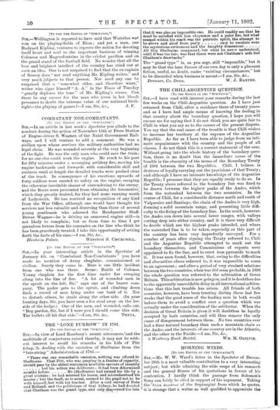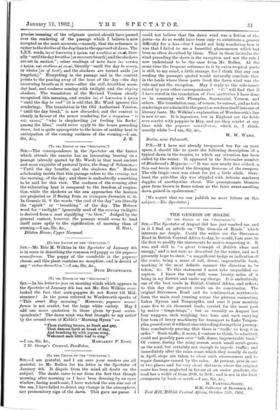MORNING WINDS.
[TO TILE EDITOR OF THE "SPECTATOR:1
SIR,—Mr. W. W. Ward's letter in the Spectator of Decem- ber 28th is a most valuable contribution to a very interesting subject; but while admiring the wide scope of his research and the general fitness of his quotations in favour of his contention, I hardly think the passage from Solomon's Song can fairly be cited in support of his argument. Taking the tisLcci7f.e, of the Septuagint from which he qUotes, it is strange that a writer so well qualified to appreciate the precise meaning of the originals quoted should have passed over the rendering of the passage which I believe is now accepted as the most accurate,—namely, that the reference is rather to the decline of the day than to the approach of dawn. The LXX. reads, ;a; 01/ Orcirri6a9 ij i7fitpa, zed rrratmasr ai crxrcili, liter- ally " until the day breathes [or recovers breath] and the shadows are set in motion "; other readings of note have is; zemia9 zai zAdlinur ai areal, literally " until the day be weary, or abates [as of heat], and the shadows are turned aside [or lengthen]." Everything in the passage and in the context points to the passing away of the heat of the day—the day recovering breath as it were—after the still, breathless noon- day heat, and coolness coming with twilight and the sloping shadows. The translators of the Revised Version clearly recognised this meaning, and render is; all &az-1,am?) iaipez " until the day be cool" (it is odd that Mr. Ward ignores this rendering). The translation in the Old Authorised Version, "until the day break," is now discarded, and the context is clearly in favour of the newer rendering, for o zorihec(rsr "iy To4 xp;votc," "who is shepherding [or feeding his flocks] among the lilies," could never apply to the hours preceding dawn, but is quite appropriate to the hours of midday heat in anticipation of the coming coolness of the evening.—I am,







































 Previous page
Previous page